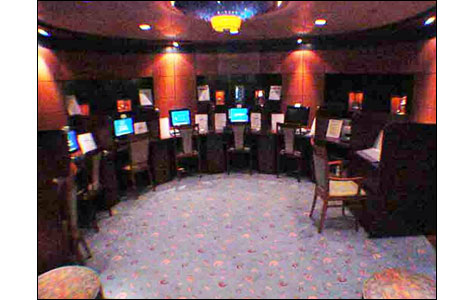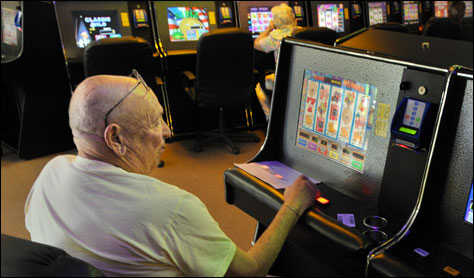 Over the past few months, several new specialty businesses have opened in Tallahassee. With names like Sands Internet Café and Dino Dino Internet Café, one might conclude these new shops are catering to people without home internet access or those telecommuting to work.
The primary business, however, is a new form of gambling becoming popular in Florida and other states: the computer-based sweepstakes.
After purchasing time on a computer, patrons can play casino-like games and win prizes including cash. Since the prizes are awarded to predetermined sweepstakes winners and not by chance, these establishments take advantage of a loophole in many jurisdictions' gambling laws.
As they become more prevalent, the sweepstakes cafés are not going unnoticed by some local officials. Mike Carmolingo, City Commissioner in Deltona, Florida, recently oversaw the unanimous passage of an ordinance prohibiting new internet cafés from opening for six months.
"What they really are is gambling houses," he told the Daytona Beach News-Journal. He is hoping the Deltona ordinance will eventually lead to an outright ban, like in North Carolina where internet cafés become non grata on 01 December 2010.
Earlier this year the Independent Weekly gathered information on the demographics of sweepstakes cafés in that state. Their research revealed that many of the burgeoning cafés exist in low-income minority neighborhoods of Durham, Raleigh and Burlington.
Senator Floyd McKissick, Jr. (NC-D) expressed his concern about gaming rooms masquerading as internet cafés saying, "...we need a way to identify businesses that are exploiting vulnerable populations who are using their limited resources on gambling."
Not all public officials are against the new ventures. Three months ago in Fall River, Massachusetts, City Councilor Leo Pelletier opened the New England Internet Café or "Leo's Place." It is apparently one of the few sweepstakes cafés in the state, having garnered little if any negative attention. Says customer Diane Zumuda, "We come here, go on the Internet, play some games, hang out. It's a fun thing to do."
Over the past few months, several new specialty businesses have opened in Tallahassee. With names like Sands Internet Café and Dino Dino Internet Café, one might conclude these new shops are catering to people without home internet access or those telecommuting to work.
The primary business, however, is a new form of gambling becoming popular in Florida and other states: the computer-based sweepstakes.
After purchasing time on a computer, patrons can play casino-like games and win prizes including cash. Since the prizes are awarded to predetermined sweepstakes winners and not by chance, these establishments take advantage of a loophole in many jurisdictions' gambling laws.
As they become more prevalent, the sweepstakes cafés are not going unnoticed by some local officials. Mike Carmolingo, City Commissioner in Deltona, Florida, recently oversaw the unanimous passage of an ordinance prohibiting new internet cafés from opening for six months.
"What they really are is gambling houses," he told the Daytona Beach News-Journal. He is hoping the Deltona ordinance will eventually lead to an outright ban, like in North Carolina where internet cafés become non grata on 01 December 2010.
Earlier this year the Independent Weekly gathered information on the demographics of sweepstakes cafés in that state. Their research revealed that many of the burgeoning cafés exist in low-income minority neighborhoods of Durham, Raleigh and Burlington.
Senator Floyd McKissick, Jr. (NC-D) expressed his concern about gaming rooms masquerading as internet cafés saying, "...we need a way to identify businesses that are exploiting vulnerable populations who are using their limited resources on gambling."
Not all public officials are against the new ventures. Three months ago in Fall River, Massachusetts, City Councilor Leo Pelletier opened the New England Internet Café or "Leo's Place." It is apparently one of the few sweepstakes cafés in the state, having garnered little if any negative attention. Says customer Diane Zumuda, "We come here, go on the Internet, play some games, hang out. It's a fun thing to do."
 Back at home Pat Fowler, Executive Director of the Florida Council on Compulsive Gambling, says the businesses are "hitting the state in huge numbers," which is of concern to the group. Fowler told the Tampa Tribune they have seen a sudden increase in calls over problem gaming to which they attribute the proliferation of sweepstakes cafés in the Sunshine State. In Hernando County, for example, at least fourteen have opened in recent months.
There are at least four here in Tallahassee. The first to catch my attention was Sands Internet Café at 4176 Apalachee Parkway. Formerly the location of Smokie's Barbeque, Sands appears to have the typical setup including "internet café" and "sweepstakes" signage outdoors. I do not know their hours of operation, but I drive past Sands every Sunday morning between 0200–0400 and the parking lot is always busy.
A mile west is Dino Dino Internet Café, 3618 Apalachee Parkway, occupying the former Gas Mart convenience store. Within walking distance of that, a new sweepstakes banner recently went up at NYK Internet Café, 3404 Apalachee Parkway. Finally, someone at the Urban Tallahassee forum reports the opening of Lucky Hit Internet Café last month at 3839 North Monroe Street.
So just where do these businesses stand legally? In May 2010, the New York Times reported the Florida Attorney General's position "that while it considers sweepstakes cafés to be in violation of state law, it is up to local law enforcement to decide whether illegal gambling is indeed taking place."
The Florida Department of Agriculture and Consumer Services regulates sweepstakes, which by definition in Chapter 849 Florida Statutes cannot have an associated purchase or entry fee requirement. The statute also requires agency notification of prizes greater than $5,000, meaning this is likely the highest possible winnings amount at these cafés. Furthermore, as devices that accept coins and paper currency are expressly prohibited, players exchange cash for electronic points and cards used for gaming.
Back at home Pat Fowler, Executive Director of the Florida Council on Compulsive Gambling, says the businesses are "hitting the state in huge numbers," which is of concern to the group. Fowler told the Tampa Tribune they have seen a sudden increase in calls over problem gaming to which they attribute the proliferation of sweepstakes cafés in the Sunshine State. In Hernando County, for example, at least fourteen have opened in recent months.
There are at least four here in Tallahassee. The first to catch my attention was Sands Internet Café at 4176 Apalachee Parkway. Formerly the location of Smokie's Barbeque, Sands appears to have the typical setup including "internet café" and "sweepstakes" signage outdoors. I do not know their hours of operation, but I drive past Sands every Sunday morning between 0200–0400 and the parking lot is always busy.
A mile west is Dino Dino Internet Café, 3618 Apalachee Parkway, occupying the former Gas Mart convenience store. Within walking distance of that, a new sweepstakes banner recently went up at NYK Internet Café, 3404 Apalachee Parkway. Finally, someone at the Urban Tallahassee forum reports the opening of Lucky Hit Internet Café last month at 3839 North Monroe Street.
So just where do these businesses stand legally? In May 2010, the New York Times reported the Florida Attorney General's position "that while it considers sweepstakes cafés to be in violation of state law, it is up to local law enforcement to decide whether illegal gambling is indeed taking place."
The Florida Department of Agriculture and Consumer Services regulates sweepstakes, which by definition in Chapter 849 Florida Statutes cannot have an associated purchase or entry fee requirement. The statute also requires agency notification of prizes greater than $5,000, meaning this is likely the highest possible winnings amount at these cafés. Furthermore, as devices that accept coins and paper currency are expressly prohibited, players exchange cash for electronic points and cards used for gaming.
 As more state legislatures take up the issue, some local law enforcement agencies have been reluctant to act while others are taking active measures. Casselberry, Florida Chief of Police James C. Ruf cites the lack of "clear direction from anyone" as one of his frustrations in trying to deal with the new businesses. Meanwhile, police in Roanoke and Virginia Beach, Virginia as well as Lynn, Massachusetts have raided and closed businesses citing violations of promotional sweepstakes laws.
At the same time, poker rooms at Florida pari-mutuel facilities are seeing record revenues due in part to the July 2010 law that eliminated buy-in limits and increased the permissible hours of operation. Legal wagering of this type is allowed at the several horse tracks, dog tracks and Jai Alai frontons operated statewide as well as at all seven Seminole casinos.
In April 2010, Governor Charlie Crist signed the Seminole Tribe Gaming Compact into law, which in addition to pumping $1 billion into the state's coffers, grants exclusive rights to operate slot machines, blackjack and baccarat games at some of their facilities.
Back in North Carolina, the Chadbourn Town Council is leaving nothing to chance. They will hold a public hearing in early December on an ordinance regulating gaming cafés, just in case the statewide ban is later overturned.
It is an uncertain future for the likes of Sands and Dino Dino. Until state or local officials decide their fate, it looks like the house will continue to win. We can only hope that the proprietors of these businesses will encourage responsible play and not blindly enable those experiencing tough financial times to flush what little they have away, all for the chance to "win it big."
As more state legislatures take up the issue, some local law enforcement agencies have been reluctant to act while others are taking active measures. Casselberry, Florida Chief of Police James C. Ruf cites the lack of "clear direction from anyone" as one of his frustrations in trying to deal with the new businesses. Meanwhile, police in Roanoke and Virginia Beach, Virginia as well as Lynn, Massachusetts have raided and closed businesses citing violations of promotional sweepstakes laws.
At the same time, poker rooms at Florida pari-mutuel facilities are seeing record revenues due in part to the July 2010 law that eliminated buy-in limits and increased the permissible hours of operation. Legal wagering of this type is allowed at the several horse tracks, dog tracks and Jai Alai frontons operated statewide as well as at all seven Seminole casinos.
In April 2010, Governor Charlie Crist signed the Seminole Tribe Gaming Compact into law, which in addition to pumping $1 billion into the state's coffers, grants exclusive rights to operate slot machines, blackjack and baccarat games at some of their facilities.
Back in North Carolina, the Chadbourn Town Council is leaving nothing to chance. They will hold a public hearing in early December on an ordinance regulating gaming cafés, just in case the statewide ban is later overturned.
It is an uncertain future for the likes of Sands and Dino Dino. Until state or local officials decide their fate, it looks like the house will continue to win. We can only hope that the proprietors of these businesses will encourage responsible play and not blindly enable those experiencing tough financial times to flush what little they have away, all for the chance to "win it big."
Photo Credit: David July
Photo Credit: "Florida" at Urban Tallahassee
Photo Credit: Bob Self/The Times-Union
Photo Credit: "Florida" at Urban Tallahassee
Photo Credit: Bob Self/The Times-Union







Hmm, I hadn't even noticed these places but this is very interesting. I don't think they'll last.
Amusingly enough, I beat the Tallahassee Democrat to the punch by six days.
When the Leon County Board of County Commissioners hold their regularly scheduled meeting tomorrow, 22 February 2011, they will discuss "internet café (simulated gambling device) issues" as part of the agenda.
Agenda Item 21: Status Report Regarding Internet Café Issues
"This item is a status report and a request for further direction to the County Attorney with regard to the internet café (simulated gambling device) issues. The County Attorney's Office has prepared a draft ordinance prohibiting simulated gambling devices for Board consideration and, if that option is ultimately adopted, Board authorization to schedule a first and only public hearing for March 15, 2011."
(via Urban Tallahassee)
From County Commissioners Voice Concerns About Internet Cafes by Candace Sweat, WCTV.
"About a dozen people showed up to the county commission meeting wearing shirts that said 'save our internet access.' But some people argue that the businesses they represent are actually gambling facilities, not internet cafes. [...] Despite growing concern, the Leon County Commission voted 5-2 to delay making an official ordinance that would regulate internet cafes. Instead, they agreed to wait and see what happens during the state's legislative session before taking action."
Read the entire article for more.
In response to the statewide increase in so-called internet cafe businesses, Representative Scott Plakon, R-Longwood, on 25 May 2011 filed HB 3 creating the Simulated Gambling Prohibition and Community Protection Act.
Plakon told the Capitol News Service, "Having five-hundred storefront casinos in our state right next to the drycleaner is a problem that needs to be solved and needs to be addressed by the legislature and I'm hopeful next year that we'll be able to do that."
The bill as submitted---which can be read in its entirety---grants the state power to prohibit "the use of simulated gambling devices to conduct or promote game promotions, drawings, and games of chance" while establishing rulemaking authority and other conditions.
From the Simulated Gambling Devices Notice by the Leon County Department of Growth and Environmental Management:
The Simulated Gambling Facility Permit Application, including instructions for completion and submittal, along with the recently adopted Regulation of Simulated Gambling Devised Ordinance (Article XXIII of Chapter 11 of the Leon County Code of Laws) are available on the Leon County Growth and Environmental Management website. All currently operating simulated gambling facilities are required to submit completed applications, including all supporting documentation, by August 15, 2011 to the address noted below to comply with the ordinance. If you have any questions regarding the ordinance, application requirements, submittal process, or other compliance related issues, please contact Emma Smith, Director of Permit and Compliance Services, at (850) 606-1364.